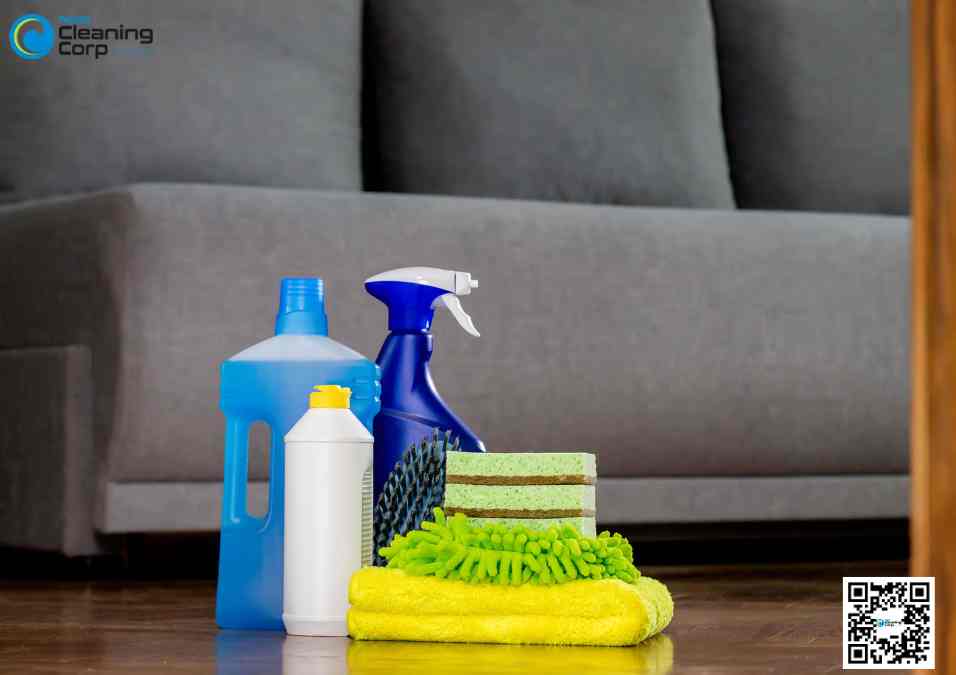Does the NDIS Fund Cleaning Services?
Yes. The NDIS does fund cleaning services — but it...
Everything you need to know about NDIS-funded cleaning support begins with how it enables NDIS participants to live in a clean and healthy environment. This service directly impacts their quality of life and supports their journey toward independent living.
The National Disability Insurance Scheme (NDIS) was designed to help people with disabilities achieve their personal goals, including maintaining a safe and accessible home. Among the many NDIS support services, cleaning services stand out as essential for ensuring that NDIS participants have a healthy living environment that accommodates their unique needs. This support addresses the daily challenges faced by individuals with varying degrees of disability who may not have the ability to manage basic cleaning tasks on their own.
According to data from the NDIA, 4.3 million Australians live with some form of disability, many of whom rely on NDIS funding for services like cleaning support. These services are crucial, as research shows that a clean home contributes to improved mental health, better physical health, and an overall enhanced quality of life.
We will explore in this post how NDIS-funded cleaning services can enhance the daily living of participants, improve their living environments, and ensure they can focus on other important goals in their lives, such as pursuing hobbies, socializing, and working.

Cleaning support is vital for NDIS participants, who often face disability-related challenges that limit their ability to manage household tasks. These tasks range from basic chores, like vacuuming and dusting, to more demanding ones, such as deep cleaning and carpet care. NDIS participants, like those with physical disabilities or developmental delays, frequently find themselves struggling to maintain their homes. Without adequate cleaning services, these individuals face a significant decline in their health and well-being.
For instance, consider the case of Emily, a 27-year-old woman with multiple sclerosis. She found it extremely difficult to keep up with her household’s daily cleaning demands due to fatigue and mobility issues. For months, she relied on friends and family to help, but this wasn’t a sustainable solution. Her NDIS plan coordinator assessed her needs and allocated cleaning support in her core support budget. Now, Emily benefits from regular cleaning services, which have not only improved the cleanliness of her home but allowed her to redirect her energy toward pursuing her goals, such as finishing her online degree.
Studies highlight the importance of clean living space in preventing the buildup of harmful allergens and bacteria, which can exacerbate health conditions. A research paper from the University of Melbourne reports that individuals who live in cleaner environments are 30% more likely to experience better mental and physical health. For NDIS participants with complex needs, the ability to maintain a clean home reduces stress and increases the likelihood of achieving long-term independent living goals.
Without access to cleaning support, NDIS participants may face an increased risk of injury while trying to manage their homes, especially when it involves heavy or physically taxing tasks like moving furniture for deep cleaning or reaching high shelves. A lack of support can lead to severe consequences, as seen in studies from the Australian Institute of Health and Welfare, which indicate a direct correlation between unsanitary living conditions and an increased rate of hospital admissions for respiratory infections among individuals with disabilities.
NDIS-funded cleaning support is a service that assists NDIS participants in maintaining a clean and healthy home environment. The service is an essential part of the National Disability Insurance Scheme (NDIS) and focuses on providing help with household cleaning tasks that participants may find challenging due to their disabilities.
Cleaning services provided under the NDIS are tailored to meet the individual needs of participants and can include everything from vacuuming and carpet cleaning to dusting, bathroom cleaning, and general housekeeping. The goal is to create a living environment that promotes good health and supports daily living. Maintaining a clean home is crucial for participants‘ well-being, as studies have shown that people living in clean spaces are more likely to experience better physical and mental health outcomes.
NDIS participants who receive cleaning support can benefit from improved independent living options, which enhances their overall quality of life. The support also reduces the risk of accidents or health issues caused by unclean or unsafe living conditions. A clean home plays an important role in preventing the spread of bacteria and allergens that could lead to respiratory issues or exacerbate existing health conditions.
To receive NDIS-funded cleaning support, participants must meet specific eligibility criteria set by the National Disability Insurance Agency (NDIA). Participants need to have an approved NDIS plan that includes funding for core supports, which cover daily activities like cleaning. The NDIS plan is customized based on the individual’s unique needs and the support they require to maintain a safe and clean living environment.
An independent assessment is conducted by the NDIA to evaluate the participant’s need for cleaning support. During this assessment, a support coordinator works closely with the participant to review their physical abilities and living situation. This assessment is crucial to determine whether the participant is eligible for cleaning services and to ensure that the services provided match their specific needs. For example, participants who have mobility issues, such as those who use wheelchairs or powerchairs, may qualify for more intensive cleaning support.
A study by the Australian Institute of Health and Welfare found that individuals with access to regular home care services, such as cleaning, reported higher levels of satisfaction with their living conditions and daily living activities. This highlights the importance of making sure participants receive the appropriate level of support based on their unique circumstances.
Selecting the right NDIS cleaning service provider is essential to ensure participants receive high-quality care and that their specific needs are met. Registered NDIS providers are required to follow strict guidelines and undergo regular checks to ensure they deliver consistent and reliable services to NDIS participants. These providers must demonstrate a commitment to understanding and addressing the unique needs of people with disabilities.
When choosing a cleaning service provider, consider their experience in delivering NDIS-funded services. Reading reviews from other participants or checking the provider’s reputation can give you insight into the quality of their services. A provider who specializes in working with people with disabilities is likely to offer more tailored services, ensuring that the cleaning tasks align with the participant’s physical abilities and preferences.
For example, a support worker might be trained to assist participants with limited mobility by ensuring that cleaning products and tools are easy to reach and use. This level of personalization is crucial for maintaining a healthy living environment without causing unnecessary strain on the participant.
It’s also important to review the service agreement carefully before signing up with a provider. Make sure the agreement outlines what specific cleaning tasks will be covered and how frequently the services will be provided. Having a clear understanding of what is included in the NDIS-funded cleaning support ensures that there are no misunderstandings later and that participants receive the full benefits of their funding.
Selecting a trustworthy and experienced NDIS cleaning service provider can significantly improve the participant’s quality of life by reducing the burden of household chores and allowing them to focus on other aspects of their NDIS goals, such as participating in community activities or pursuing independent living options.
NDIS-funded cleaning support works by providing a streamlined process for participants who qualify for cleaning services under their NDIS plan. Once an NDIS participant is approved for cleaning services, the first step is establishing a service agreement between the participant and the service provider. This agreement outlines the specific cleaning tasks to be performed, the frequency of services, and any special requirements tailored to the participant’s needs. The service agreement is essential as it ensures clear communication between both parties and prevents misunderstandings about what services will be provided.
Participants utilize their core support budget to pay for cleaning services, which is part of the funding allocated by the NDIS for daily living assistance. The core support budget is designed to cover a wide variety of essential services, including household cleaning, deep cleaning, and disability-friendly cleaning solutions. These services are critical for maintaining the safety and cleanliness of the participant’s home environment.
The support coordinator and plan manager work closely with the participant to oversee the funding allocation and ensure that the cleaning services are delivered as per the NDIS plan. The plan manager plays a key role in managing the financial aspect of the NDIS funding, ensuring that the participant’s funds are allocated efficiently. The support coordinator focuses on making sure that the services provided align with the participant’s overall goals, such as promoting independent living and improving the quality of their living conditions. With this oversight, participants receive consistent, high-quality support that fits their specific needs.
NDIS-funded cleaning services encompass a wide range of household tasks tailored to the needs of NDIS participants. These services go beyond basic housekeeping and include more specialized tasks that address the challenges participants might face in maintaining a clean and healthy home.
The services typically cover general housekeeping, such as vacuuming, dusting, mopping, and laundry, all of which are crucial for ensuring a hygienic living space. More specific services, such as carpet cleaning, sanitization, and deep cleaning of bathrooms and kitchens, are also offered to address areas that might pose additional challenges for participants with physical or cognitive disabilities. For example, a participant who has difficulty with mobility may struggle to clean hard-to-reach areas, making professional deep cleaning services essential for maintaining their home.
Support coordinators work with participants to assess their individual cleaning needs and select services that best fit within their core support budget. Services may include specialized tasks like sanitization for those with weakened immune systems or tailored cleaning for participants with allergies or sensitivities. Research from the National Institute for Health Research shows that maintaining a clean living environment significantly reduces the risk of infection and improves the well-being of individuals with chronic health conditions. Participants can access a variety of services that meet their needs while ensuring their home remains a safe and welcoming environment.
Real-life examples highlight the tangible benefits that NDIS-funded cleaning support offers to participants. Take the case of James, a 45-year-old man with a physical disability who struggled with routine household chores such as vacuuming and mopping due to his limited mobility. His NDIS plan included funding for regular cleaning services, which significantly improved his ability to maintain a clean and organized home. With the help of a reliable NDIS cleaning provider, James now enjoys a more comfortable and accessible living environment.
In another example, Sarah, a 32-year-old woman with cognitive impairments, found it difficult to manage the complexity of cleaning her home. Her NDIS plan included regular deep cleaning services, which ensured her home remained a safe space without clutter or dust buildup, helping her maintain focus on achieving her independent living goals. These stories illustrate how NDIS cleaning support not only eases the burden of household chores but contributes to participants’ overall well-being and ability to live independently.
A study from the University of Sydney found that participants who receive home care services, such as cleaning, reported higher levels of life satisfaction and improved mental health outcomes. These findings emphasize the critical role that clean, safe living environments play in supporting NDIS participants as they work toward their goals for independent living and community participation.
Key Takeaways
In summary, NDIS-funded cleaning support provides vital assistance to individuals with disabilities, ensuring they can maintain a clean, safe, and comfortable living environment. By covering a wide range of services, from basic housekeeping to more specialized tasks like carpet cleaning and sanitization, NDIS cleaning services significantly improve participants’ quality of life. With the help of support coordinators and plan managers, participants can access tailored services that align with their individual needs and NDIS plan goals.
Real-life examples, like James and Sarah, highlight the profound impact these services have on fostering independent living and enhancing overall well-being. Research confirms the importance of a clean home for physical and mental health, making these supports invaluable for those navigating the challenges of daily life with a disability. Whether through regular vacuuming or deep cleaning, NDIS-funded cleaning services offer the practical support participants need to live independently, safely, and with dignity.
More Post

Yes. The NDIS does fund cleaning services — but it...

Alright, let’s get straight into it. These are the questions...

NDIS cleaning services are specifically designed to cater to the...

The role of professional cleaning in maintaining a safe and...

Studies consistently show that living in a clutter-free, organized space...